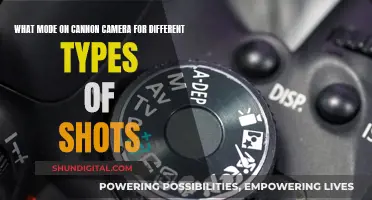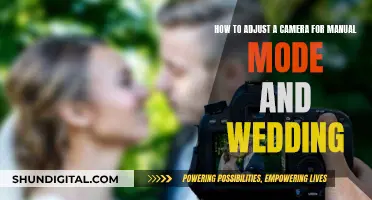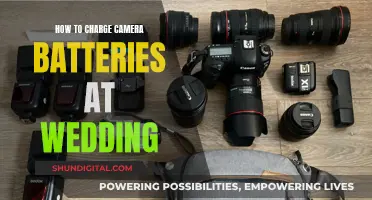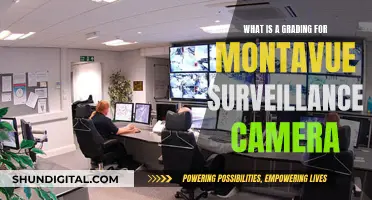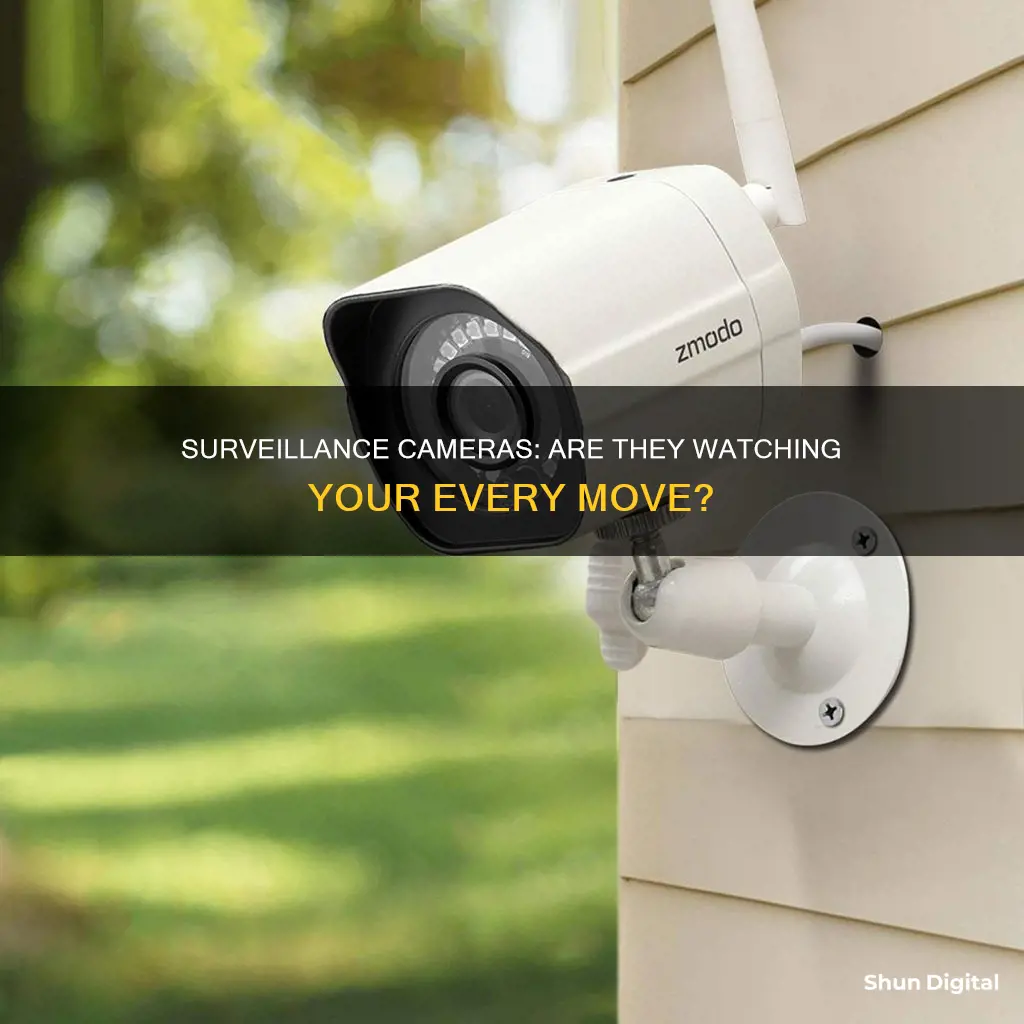
Surveillance cameras are a common sight, found on street corners, buildings, and in public and private spaces. With today's technology, surveillance cameras have become a powerful tool for monitoring and recording activities, raising questions about their legality and impact on privacy. While some people feel safer with the presence of cameras, others view them as an invasion of privacy, sparking a debate about the appropriate use of surveillance in society. In this context, it is worth examining the prevalence of surveillance cameras in various places and the associated legal implications.
| Characteristics | Values |
|---|---|
| Privacy | People generally do not have a right to privacy in public places. However, there is an expectation of privacy in private places, such as bedrooms, bathrooms, changing rooms, and locker rooms. |
| Legality | Surveillance cameras are generally legal in public places. However, there are some laws and regulations around privacy and consent that need to be considered. |
| Purpose | Surveillance cameras are used to improve public safety, deter and catch criminals, and monitor traffic. |
| Effectiveness | The effectiveness of surveillance cameras in reducing crime is debated. While some argue that they help deter and catch criminals, others claim that they do not effectively deter all types of crimes. |
| Cost | Surveillance cameras can be expensive to install and maintain. |
| Abuse | Surveillance cameras may be abused by law enforcement or individuals for voyeurism or blackmail. |
What You'll Learn

Privacy concerns
Surveillance cameras are commonplace in today's world, with cameras monitoring people's movements in public spaces, outside their homes, and even inside private residences. While these security measures may provide certain benefits, there are significant privacy concerns that arise from the widespread use of surveillance cameras.
One of the primary privacy concerns relates to the expectation of privacy. Individuals generally have a reasonable expectation of privacy in certain places, such as their homes, bedrooms, bathrooms, and changing rooms. When surveillance cameras are placed in these private spaces, they can invade people's privacy and make them feel uncomfortable. For example, a landlord who installs a hidden camera inside a tenant's apartment without their consent is clearly violating their privacy.
The placement of cameras outside of private residences can also raise privacy concerns. While it is generally acceptable to have cameras monitoring the exterior of a building or public spaces, issues arise when these cameras are directed towards areas where individuals have a reasonable expectation of privacy, such as pointing directly into someone's bedroom window.
In addition to the placement of cameras, the use of hidden or covert cameras can also be problematic. While hidden cameras are allowed in certain circumstances, they can easily be abused and used for voyeurism or blackmail. The lack of control and limits on the use of hidden cameras is a significant concern for many people.
The effectiveness of public security cameras has also been questioned. While they may help deter and solve crimes, they also come at a high cost to taxpayers. Some argue that the money spent on surveillance cameras could be better used elsewhere, especially if the cameras are not effective enough in preventing crimes and protecting people's safety.
Furthermore, the widespread use of surveillance cameras can lead to potential infringements on civil liberties. With thousands of mobile government cameras on the streets and the increasing use of aerial drones for surveillance, many individuals worry about the bounds of privacy versus police activity. The ease of accessing live city video surveillance also raises concerns about who has access to this footage and how it can be used.
Lastly, the varying laws and regulations regarding surveillance cameras can make it confusing for people to understand their rights and how to protect their privacy. While there are federal and state laws governing the use of security cameras, the specifics can differ from state to state, and some counties and cities have their own additional laws. This complexity can make it challenging for individuals to know how to navigate their privacy rights and ensure their personal spaces are protected from unwanted surveillance.
Focus Camera: Where is it Located?
You may want to see also

Surveillance cameras in public spaces
The presence of surveillance cameras in public spaces is a contentious issue, with strong arguments for and against their use. Proponents of surveillance cameras in public spaces argue that they improve public safety and help to deter, prevent, and solve crimes. They also provide valuable evidence during police investigations, which can help to convict criminals or prove someone's innocence. Additionally, relevant authorities can monitor road conditions and make real-time traffic reports to help people choose the best route when going out.
On the other hand, critics of surveillance cameras in public spaces argue that they infringe on civil liberties and privacy expectations, even in public areas. The potential for abuse and misuse of surveillance footage is a significant concern, as it can be used for voyeurism, stalking, or blackmail. The effectiveness of surveillance cameras in actually preventing crimes is also questionable, especially in the case of suicide attackers or bombings. The high cost of implementing and maintaining these systems is another disadvantage, with limited results in some cases.
To balance public safety and privacy concerns, guidelines and regulations have been proposed for the use of surveillance cameras in public spaces. These guidelines include obtaining informed consent by posting clear and precise signs, providing information about who is operating the system, avoiding inappropriate views of private areas, and establishing legally enforceable rules for the operation and access to archived video footage.
Overall, the debate around surveillance cameras in public spaces centres on finding a balance between improving public safety and preventing crimes while also respecting individuals' privacy and civil liberties.
School Bus Camera Tickets: Are They Legal?
You may want to see also

Legality of security cameras
The legality of security cameras varies depending on the location and the type of recording. In general, it is legal to record video in public spaces as long as there is no reasonable expectation of privacy. However, there are specific places where individuals have a reasonable expectation of complete privacy, such as bathrooms, changing rooms, hotel rooms, and bedrooms. In these places, conducting video and audio surveillance without explicit permission or notification is illegal.
When it comes to audio recording, the Federal Wiretap Act imposes civil and criminal liabilities for intentionally recording conversations without consent. The Electronic Communications Privacy Act of 1986 provides an exception for job-related conversations, allowing employers to record without the consent of employees.
In the United States, there are also varying state laws regarding the use of security cameras. For example, in California, it is illegal to record confidential communications, while in Alabama, hidden video surveillance is only permitted in non-private locations.
To ensure compliance with the law, it is essential to be aware of the specific regulations in your state or country regarding video and audio surveillance, privacy, and consent.
Reolink Cameras: Made in China?
You may want to see also

Effectiveness of surveillance cameras
The effectiveness of surveillance cameras in preventing and solving crimes is a highly debated topic. While some argue that surveillance cameras can help deter and reduce crime, others claim that they have little to no impact on crime rates and may even lead to an increase in certain types of crimes.
One of the key arguments in favour of surveillance cameras is that they can act as a deterrent, potentially preventing crimes from occurring in the first place. Proponents of surveillance cameras point to the success of such technology in specific contexts, such as parking lots and public transit systems, where their use has been linked to a significant decrease in crime. For example, a study by Brandon Welsh and David Farrington, which analysed 22 studies of CCTV in the US and UK, found a very small impact on crime that was statistically insignificant. However, the same study also concluded that CCTV reduces crime to a small degree when combined with other interventions such as improved lighting and increased security personnel.
On the other hand, critics of surveillance cameras argue that they have not been proven effective in reducing crime. For instance, a British Home Office study in 2005 by Martin Gill and Angela Spriggs, which examined 14 sites, found that CCTV schemes produced no overall effect on relevant crime viewed collectively. Similarly, a 2013 Chicago Tribune opinion piece noted that while surveillance cameras helped solve 4,500 crimes over four years, there were still an estimated one million crimes committed during that time, indicating that the cameras' contribution was minimal at best.
In addition, there are concerns about the potential invasion of privacy and the high financial cost associated with installing and maintaining surveillance cameras. Civil liberties advocates argue that the benefits of deploying public video cameras must be balanced against the risks and costs involved. Furthermore, the use of surveillance cameras has also been linked to issues such as discriminatory targeting and voyeurism, with studies finding that camera operators disproportionately focus on people of colour and spy on women for non-surveillance reasons.
While the effectiveness of surveillance cameras remains a subject of debate, it is clear that their implementation must be carefully considered, taking into account potential benefits, costs, and impacts on civil liberties.
Lithium-Ion Batteries: Powering Your Camera
You may want to see also

Privacy laws
The use of surveillance cameras in public spaces is a highly debated topic. While some individuals feel more secure with the presence of cameras, others feel nervous about being under constant surveillance.
In the United States, there is no specific federal law governing the use of security cameras. However, there are national consent and privacy laws that apply to video surveillance, and it is important to understand the legal implications before installing cameras.
There is a general expectation of privacy in places that are assumed to be private, such as bathrooms, changing rooms, shower areas, locker rooms, hotel rooms, and bedrooms. It is considered a violation of privacy to install cameras in these areas, as individuals have a reasonable expectation of not being observed in such settings.
For residential properties, it is generally legal to install security cameras outdoors, as there is no expectation of privacy in public places. However, if a camera captures footage of a private area, such as a neighbour's bedroom or bathroom window, it may be seen as an invasion of privacy.
For indoor cameras, it is important to obtain consent, especially in private residences. For example, a landlord installing a hidden camera in a tenant's apartment without their knowledge is a clear violation of privacy. In some states, consent is required for hidden camera surveillance in both public and private locations.
Businesses also need to navigate privacy laws when installing security cameras. While it is generally acceptable to conduct surveillance in public areas of a business, such as a store floor, cameras are not permitted in places where individuals have a reasonable expectation of privacy, like bathrooms or changing rooms. Additionally, employees should be made aware of the security policy and the use of recording devices to ensure compliance with privacy laws.
One-Party and Two-Party Consent Laws
In addition to privacy laws, it is important to consider consent laws, particularly when it comes to audio recording. On a national level, the "one-party consent" law states that it is legal to record a conversation, either in person or over the phone, if at least one person involved consents to the recording. This law applies to security cameras that record audio, so it is important to ensure that at least one party is aware of and consents to the recording.
However, some states have two-party consent laws, which require all parties involved in a conversation to give consent for the recording to be legal. These states include California, Delaware, Florida, Illinois, and Maryland, among others.
State and Local Regulations
While there may not be specific federal laws, individual states and local governments have their own regulations regarding security cameras. Currently, 15 states have specific security camera laws, and it is important to review these laws before installing cameras. Some states require consent for hidden camera surveillance, while others only allow hidden cameras in public places.
International Context
The use of surveillance cameras in public spaces is not unique to the United States, and other countries have their own laws and regulations. For example, in New York, police are required to obtain a warrant from local authorities before using video surveillance as part of a criminal investigation.
The legality of security cameras is a complex issue that involves navigating privacy and consent laws at the federal, state, and local levels. It is important for individuals, businesses, and law enforcement agencies to understand and comply with these laws to ensure the protection of citizens' privacy rights.
Updating Adobe Camera Raw: A Simple Guide
You may want to see also
Frequently asked questions
The use of surveillance cameras varies depending on the place and local laws. Generally, outdoor cameras are common in urban areas, with many buildings having security cameras at every corner.
Surveillance cameras are typically permitted in public places, such as streets, parks, and other outdoor locations. However, there may be restrictions on placing cameras in certain sensitive areas where privacy is expected, such as bathrooms or changing rooms.
Surveillance cameras in public places can help improve public safety, deter crime, and assist in catching criminals. They can also provide evidence for investigations and help monitor traffic conditions.
Yes, some people may have privacy concerns. There is also a risk of abuse of surveillance footage, and the effectiveness of cameras in preventing certain types of crimes, such as suicide bombings, has been questioned.
The legality of surveillance cameras depends on the specific laws of the state, county, or city. While there may not be specific federal laws, there are national consent and privacy laws that apply to video surveillance, and audio recording may have additional requirements.




